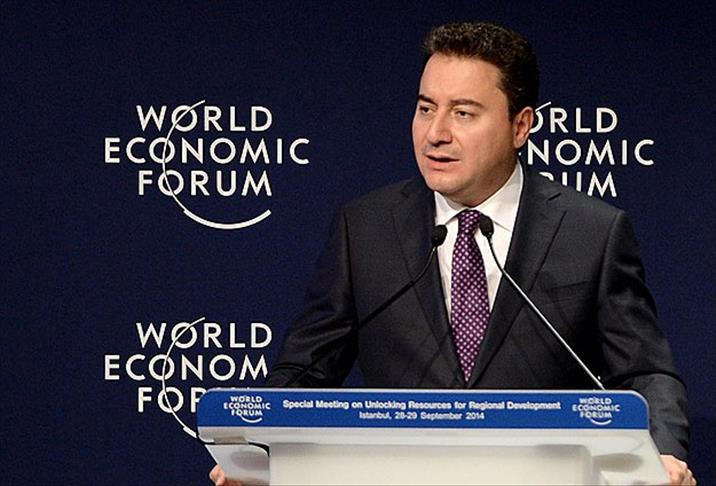
ISTANBUL
Turkish Deputy Prime Minister Ali Babacan has told a World Economic Forum meeting in Istanbul that Turkey sees the importance of “networks for solidarity and cooperation” across the Middle East and North Africa region.
Babacan delivered a wide-ranging speech on Monday at a WEF Special Meeting which attracted 480 participants from over 70 countries.
The minister said one major principle for Turkey in the MENA region was to ask for peaceful settlements of disputes and conflicts.
"In this geography multiculturalism is the key, as well as respecting differences and seeing diversity as richness, [something] which we have achieved for centuries...
“We are very hopeful for the future… That is why we have lifted visas and have signed free trade agreements with many countries in the region; we did so to allow an easier circulation of people goods and services."
Pointing to recent developments in Syria, Iraq and elsewhere in the MENA region, Babacan stressed that it was a difficult area in which to maintain stability.
"Turkey has certain principles whenever it approaches MENA and we continue to respect those principles regardless of the developments," he said.
Upon a question on how the ongoing crisis in Syria and Iraq would affect the global economy, Babacan said those were now "one of the most geopolitical threats to the global economy and a long-term issue" to be solved.
"[The crisis in] Syria and Iraq is a huge humanitarian problem that we are observing. Twenty thousand people are dead already. Iraq and neighboring countries are natural-resource rich nations. Oil supplies or transportation roots could cause a higher oil profile picture which will affect the global economy," Babacan said.
The Islamic State of Iraq and Levant launched an offensive in mid-September, capturing large swathes of land in Iraq and Syria, declaring what it calls a cross-border Islamic 'caliphate,' killing thousands and displacing millions in the two countries.
It has posted graphic online videos of mass executions, as well as the beheading of Western hostages. Additionally, IS has already captured a number of oil-producing areas in northern Iraq.
Pointing out that Turkey has undergone a major economic and political transformation in the last 12 years, Babacan said the accession process to the European Union helped Turkey with its reform process.
"Accession to the EU increased the quality of democracy and the practice of human rights... the EU criteria acted as a guide to further reform.
“But still, we have a lot to do. We need to improve the quality of democracy, to make sure that fundamental rights and freedoms are even more widely practiced and to ensure that Turkey sees a real rule of law,” he added.
Over million Turkish people found work between June 2013 and 2014 according to Babacan, who said the government offered advantages to companies or employers who hired young people or women.
Babacan also noted that Turkey's economic growth rate hit 9 percent since 2012 and that the citizens understood in a very constructive way that one should consume in line with what he earns.
"The growth is coming both from domestic consumption and exports... Fort next year, 6 to 7 percent growth is easy for us but it's risky, so we want to keep the growth slow," Babacan added.
Finally, the minister touched upon Turkey’s G20 presidency in 2015, saying that Ankara will try to be a bridge between G20 countries and least-developed states “because these countries have huge potential."
Anadolu Agency website contains only a portion of the news stories offered to subscribers in the AA News Broadcasting System (HAS), and in summarized form. Please contact us for subscription options.

